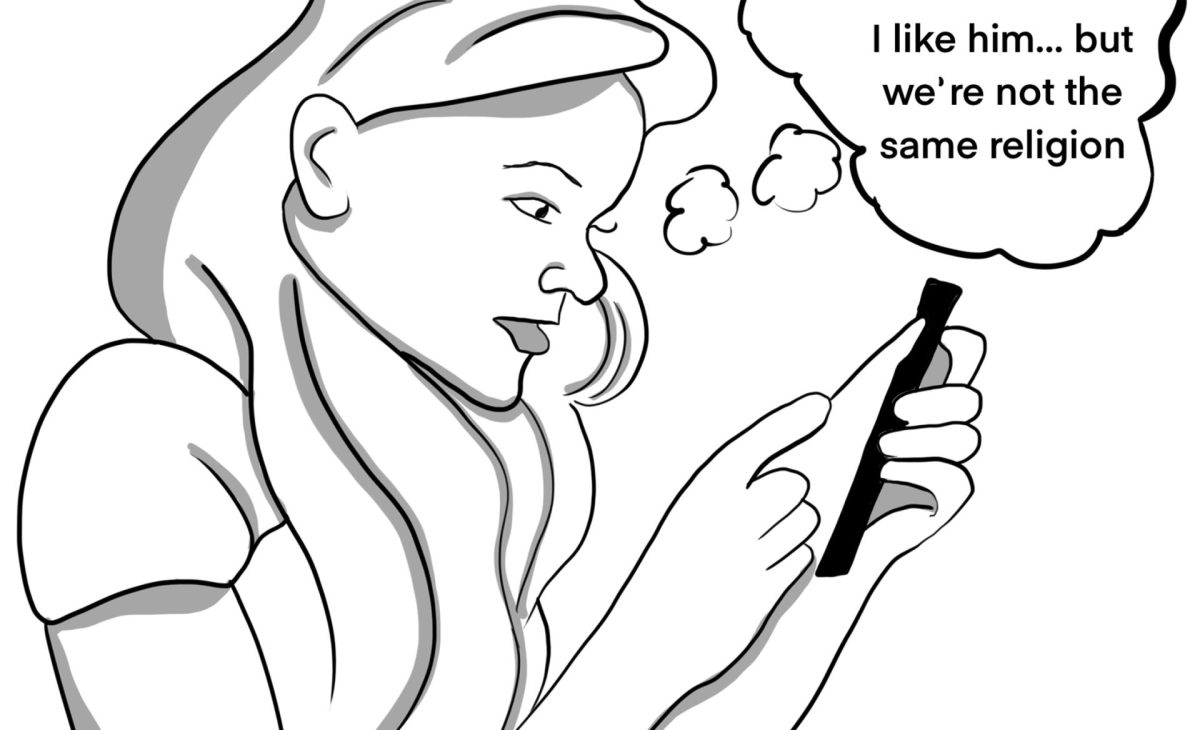Spring is here, and romance is in the air. As the days get warmer, people are once again looking for connection. Some might find love in a classroom, during a lakeside jog or, more commonly these days, on a dating app.
Dating apps are taking the world by storm, especially among younger people. Of all age ranges who participate in online dating, 53% of users are 30 years old or younger. These apps are shaping modern dating with one click.
It’s easy to log on, swipe through endless profiles and sort people with a flick of a thumb — right for those who fit your type, left for those who don’t. But what are the potential consequences of filtering for people like you?
One checkbox that often feels important is religion. That’s why there are dating apps specific to faith — Christian Mingle, Jdate, CatholicMatch and so on.
These platforms garner a lot of online attention. Christian Mingle alone has around 16 million users. And honestly, the appeal is obvious. These are apps designed for people seeking marriage, shared values and cultural continuity. Users have comfort by assuming their potential matches share their core beliefs.
Yet, there could be negative consequences to limiting your scope, even with something as personal as religion. Only dating within your faith can create insular relationships that lack intellectual or spiritual diversity. It can limit growth and prevent people from understanding or empathizing with other worldviews.
For one, dating apps as a whole already produce an echo chamber effect, mainly due to an algorithm. Most platforms, like Tinder and Hinge, show you users based on “compatibility.” This is taken from subtle data: who you liked, who you lingered on for a little too long or whose profile you clicked. Over time, the app just starts to mirror you back to yourself.
This creates polarization and prevents you from seeing people who aren’t only different, but could be potential lifelong partners. The more the app learns your preferences, the less room there is for surprise. You’re not just swiping past people, but also possibilities. Modern dating is now the equivalent to ultra-filtered matchmaking.
For religious dating apps specifically, how the algorithm works still applies — but the loss of possibility happens the moment you download. By cutting off those outside of your faith, you risk missing out on people who may share your core values — even if they don’t share your religion. Connection isn’t always built on identical beliefs, but on shared priorities, morals and ways of being in the world.
DePaul freshman Jesse Martinez resonates with this sentiment. “I want to marry someone to support the things that I support and sometimes my religion doesn’t allow that,” they said. “Although I may want to marry someone Catholic, I want to marry a Catholic who has the same viewpoints as me.”
Like I said before, though, the appeal is strong. Many people use these apps to find long-term, like-minded partners. For some, faith isn’t just a preference — it’s a lifestyle, a future parenting plan and moral compass.
Rabha Ashry, a professor of writing, rhetoric and discourse, echoed the positives of dating within your religion.
“Having a shared cultural background helps in understanding each other. You don’t need to establish this foundation about shared values as much because it kind of already exists,” Ashry said. “There’s a mutual understanding of where we come from, while in relationships with people from different backgrounds there is an element of introducing and educating.”
Psychologists have supported this claim, finding that couples with similarities have higher relationship satisfaction. But, this doesn’t necessarily apply to religion. Two people can belong to the same faith, but that doesn’t always mean they practice it similarly. This false impression of compatibility can lead to mismatches, especially when an app focuses on religion exclusively. Differing levels of commitment can lead to later tension and create unsustainability in the relationship.
I believe that our relationships should challenge us — emotionally, intellectually, and yes, religiously. Being in an interfaith relationship can push you to reconsider the “whys” of what you believe, and in turn, bring you closer to your faith.
Sure, faith can be the starting point, but shared curiosity, compassion and communication should be the compass. These religious dating apps shouldn’t erase differences; they should help us navigate them.
So, the next time you log into a dating app (religious or not) and start swiping, think more deeply about who that person is — and what their differences could offer. The best connections don’t come from people who check every box, but from those who help us grow into better people.
Related Stories:
- EmLovz dating coach: Finding love in the modern age
- COLUMN: Online dating isn’t for the weak of heart
- College students love dating apps, but is it worth it?
Support Student Journalism!
The DePaulia is DePaul University’s award-winning, editorially independent student newspaper. Since 1923, student journalists have produced high-quality, on-the-ground reporting that informs our campus and city.
We rely on reader support to keep doing what we do. Donations are tax deductible through DePaul's giving page.


